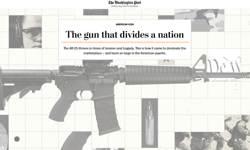I like a good whodunit. All the more so when it has a journalistic trope. So it was with relish that I settled down with Stieg Larsson’s “The Girl Who Kicked The Hornet’s Nest”, to find out who was murdering the Svenska Morgon-Posten.
Erika Berger, the husky-voiced newly-appointed campaigning editor of SMP with the come-to-bed eyes, was facing her chief financial officer and the editorial budget chief across the boardroom table while they identified all the usual suspects:
* Slump in advertising
* Downturn in single copy sales
* Free metro papers cutting into revenues
* Collapse in value of the company’s stock portfolio
* Creaking technological infrastructure
* Gradual sale of assets
The money men proffered the customary remedy — get rid of people on the “cheese plane principle: shave a job here and a job there”, starting with sport. Staff with temps, leave jobs unfilled. Lose more reporters.
But Erika knows the real killer, skulking behind the arras. The paper has fewer and fewer employees responsible for more and more text every day: “The articles they turn out are terrible, superficial, and they lack credibility. That’s why SMP is losing its readers.”
So there you have it, one of the world’s best-selling authors of the past eighteen months, putting editorial quality at the heart of his sub-plot.
The meaning of quality
“Quality”... that strange and perpetually hijacked Latin word, with its chameleon-like meanings. A distinctive characteristic, a grade of excellence, a personality trait, superiority. We all know it when we see it.
It’s had a lot of press. I’m old enough to remember when Total Quality Management was flavour du jour. “Get it right first time”, “ISO 9000”, “ISO 9001”, “BS 5750”. All that lot.
To the editor of InPublishing (it says in his brief), quality is defined in terms of the journalistic product, the writing, the reporting, the investigating and campaigning and (old-fashioned word), the integrity.
And to sages such as George Monbiot, and the excellent Matthew Engel, the quality of newspapers, particularly the thousands in the regional sector, leaves a lot to be desired.
In an eviscerating column, albeit inspired by a row over a Tesco’s planning application in Machynlleth, Powys, the Guardian columnist declared, “I, too, mourn good local newspapers. But this lot just aren't worth saving.” The charges of vacuity and cowardice by publishers and editors were just two of his accusations.
More damaging in its way, and more forensic in its analysis, was Matthew Engel’s “Local Papers: An Obituary”, published in the British Journalism Review which reached the damning conclusion, now so ubiquitous that it is passing into the realms of conventional wisdom, that: “If the local press is to be saved, it cannot be left in the hands of the groups whose obscene profit demands have wrecked real journalism.”
The papers, said Engel, have become drably conformist clones punished by earlier deadlines, reduced staffing levels and ever-worsening pay. And, he added destructively, under-investment in the quality of their publications by mean-spirited management.
Are things really that bad?
Manchester R.I.P.?
Certainly it’s not a great time to be a regional press journalist if those I speak to are to be believed and the acrimonious fall-out from the “deal of the decade” sale of the Manchester Evening News — which had its proud and rich journalistic heritage highly lauded in the accompanying PR spin — to Trinity Mirror made sorry, and sad, reading indeed.
They’ve lost their district offices, their city centre HQ, their editor, but most importantly many of the journalists who built that legacy, including their last staff photographer. I can’t be the only person who found his departing comment unbearably poignant: “I've loved my time there; I've done some amazing things. It's been good, but I certainly wouldn’t push somebody young towards that sort of thing."
Well, if we don’t push young and talented people into the industry, and sustain them at the content-gathering end of the operation, then traditional publishing of any form is doomed.
Originally-created content
Which leads me to the first of my quality benchmarks: For a publication (online or offline) to be considered a quality product, it must maintain a very high ratio of originally-created content. Not opinions, many of them vapid and just plain wrong, launched upon the world from behind the twitching net curtains of the blogosphere but from what Harold Evans described in his autobiography “My Paper Chase” as “good shoe leather reporters”. People who go out and ask questions and validate the answers by cross-checking. As David Simon said – you never see a blogger in court or at a council meeting. The problem is that you increasingly don’t see reporters there either.
There’s an exercise I sometimes do with publishers and journalists by taking a copy of that day’s paper and striking out everything which has not been originated by staff journalists or commissioned freelances. Then we strike out every item which is not unique. Follow-ups only avoid excision if they contain substantial new information which carries the story forward. Finally, and this is the killer, we place a price on everything that is left that we think a reader would be willing to pay. The results will demonstrate the scale of the opportunity, or the size of the problem. The challenge, in every case, is to increase the percentages in favour of the enterprise.
What’s the best story of the past twelve months? John Terry right? You would think so from the way it buried Tony Blair’s appearance before the Iraq inquiry.
Making a difference
But most people would vote for the Daily Telegraph’s handling of the MPs’ expenses scandal. Setting aside that the genesis of the story was a buy-up, the subsequent coverage was as gripping a model of investigative journalism as I have witnessed since the days of Watergate and Thalidomide.
So it should be you might think. The Daily Telegraph is a major international newspaper full of bright people who can exploit an open goal when they see it. But quality is not a scale issue. I offer you the example of Willie O’Dea, the newly disgraced (and former) Irish Minister of Defence, out of office following an interview with Michael Dwane, reporter with the Limerick Chronicle, a modestly staffed paper owned by Johnston Press.
O’Dea suggested to the reporter that a Sinn Fein electoral rival part-owned an apartment that had been used as a brothel. Legal uproar followed and the minister swore an affidavit denying he had made the allegation. But the reporter had him on tape.
Two very different newspapers. Same outcomes. Collapse of stout parties and a huge boost to editorial credibility and publishing reputation.
The Willie O’Dea comments were made to the reporter at the end of a very long day, and a second quality threshold is the amount of time that publishers allow their staff to invest in finding and developing stories. Good stories, the kind that make a difference, don’t come easily, and even when they are found, there is usually a painful process of creation, validation, and peer review before they can be published.
The nature of journalism
It is, as any teacher knows, far easier to transmit information than to create understanding among an audience. Many newspapers think they’re in the transmission business. They’re not. There’s no money in it. Their role is to create comprehension through popular explanatory journalism.
The phenomenal growth of dynamic reaction channels such as blogging, Twitter, all that jazz, leads some major publishers to believe that this will be the journalism of the future. True, it has its journalistic applications. If you want to broach the rumours about Gordon Brown’s medication, Avram Grant’s experience of massage parlours, the true age of Nigerian footballers then a journalist can find a peg by saying it’s being discussed in Blogland. It can even have a serious public interest role to play as it did in the liberation of the Trafigura case.
But leaving aside the argument about whether the supposed “democratisation” of information produced by the internet may ultimately have a corrosive impact on our lives and emotional and mental health, the inescapable truth is that journalists act, and bloggers react. Anticipating a revenue stream from reaction and comment will prove to be a fatally-flawed strategy. There’s already too much ambient noise in the world to pay for more.
When I sat for seven years in the chair once occupied by Harold Evans at Darlington, I made some modest attempts to rekindle the campaigning and investigative journalism that put the Northern Echo on the map during his tenure in the North East. Part of the reason was that I believed (and still do) that a really good regional and local newspaper can make a massive difference to a community. But the other part of the equation was that it created unique content (most other newspapers being unwilling to ride a rival’s hobby-horse at the same time). And unique content was then, and is now, essential. More important than format, more important than forms of delivery, more important than technology. And it should certainly have a higher priority than management jargon about new distribution models, multi-media platforms and publishing portfolios.
Outside of the well-defined major national titles, it seems to me that many of the newspapers I see have had their voices reduced to a murmur. Insecurity may be the condition of the journalistic age as Alan Rusbridger said in his Cudlipp Lecture, but at a time when we need to be bold and entrepreneurial, it also keeps editorial heads tucked well down between the parapet and the parados.
In a recent interview, the Italian polymath Umberto Eco was musing on the impact of Google. You might think that with his taste for the arcane and unusual that he would be an enthusiast. But not a bit of it.
“For young people”, he said “Google is a tragedy. Schools ought to teach the high art of how to be discriminating.”
Knowledge, he says, is about knowing how to find something. Not just finding it.
It’s also an essential component for any quality newspaper, large or small. Once that commitment has gone, what is left is the mediocre middle ground. When quality is compromised, what is left will be commodity. And then, death.










